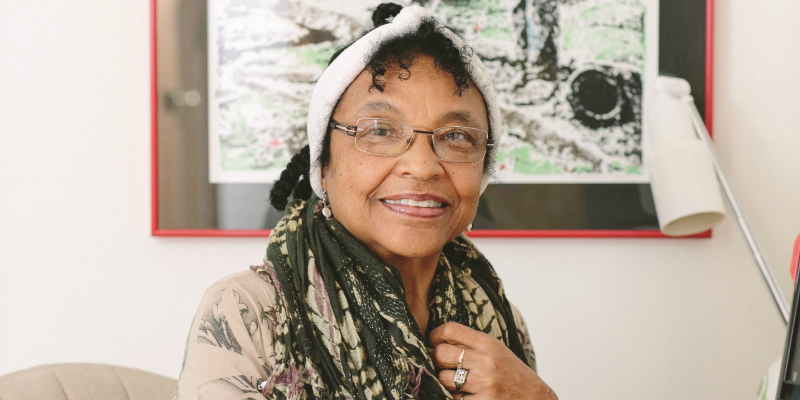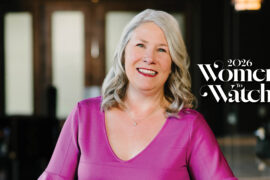By Laura Anne Bird | Photographed By Kaia Calhoun
In her new book, “Settlin’: Stories of Madison’s Early African American Families,” Muriel Simms doesn’t just piece together her own family history; she gives voice to the black men and women who began arriving in Madison as far back as the 1840s.
“They had a determination to stay here and put down roots,” Simms says. “They wanted to thrive, not just survive. That’s what a pioneer does.”
For over 10 years, Simms tracked down the children, grandchildren, neighbors and friends of Madison’s earliest black residents. “Their contributions and struggles were never recorded, but I knew they had stories to tell,” she says.
In “Settlin’,” Simms captures more than 20 inimitable accounts of Madison’s first black-run businesses, churches and newspapers. She introduces readers to Leo Butts, the first black football player for the Badgers, and to Pia Kinney James, the first woman of color to be hired by the Madison Police Department. She also includes stunning photographs, helpful appendices and surprising appearances by notables like Booker T. Washington and Duke Ellington.
Of everyone she interviewed—and the ancestors they affectionately discussed—Simms says, “They were resilient, vibrant, active and kind. They stood up for things.”
In 1944, when Simms was born in Madison, just 1 percent of the population was African-American.
She was the only black student in her class at East High School, which was sometimes difficult. “My parents taught me to be who I am. They were always behind me. I could do anything in spite of how kids treated me. I could rise above it,” she says, adding that she was particularly inspired by her mother, who complained to the owner of Yost’s clothing store for not allowing black women to try on garments. After she spoke up, he changed his policy.
Simms graduated from UW-Madison in 1968 with a degree in English. She went on to earn her master’s in Curriculum and Instruction, ultimately serving as a teacher, learning coordinator and principal at a number of Madison public schools. In 1992, she was recognized as the Wisconsin Elementary Principal of the Year. “I was committed to meeting each kid where they were at,” she says.
After receiving her doctorate in 2002, Simms joined Edgewood College as an adjunct faculty member. She continues to work while staying busy with Zumba, the NorthSide Artists Group, and Friends of Cherokee Marsh, which she co-founded.
The books on Simms’ shelf:
The titles on Muriel Simms’ overflowing bookshelf are largely about social justice and social behavior. “These books contain new knowledge and areas of study I think people should know about.”
I Know Why the Caged Bird Sings
Singin’ and Swingin’ and Gettin’ Merry Like Christmas
The Heart of a Woman
By Maya Angelou
Angelou’s autobiographical series highlights her search for dignity in a world filled with ignorance and hate. She shares riveting details about her personal life while illuminating the struggles of black people to secure their rightful place in our country. “Angelou’s language and honesty make her story one you won’t forget,” Simms says.
Tipping Point
Blink
Outliers
By Malcolm Gladwell
“People who want a new perspective on how the world works should read Gladwell’s books,” says Simms. He cleverly incorporates history, social psychology, statistics, law and economics to challenge commonly-held assumptions.
Stamped from the Beginning: The Definitive History of Racist Ideas in America
By Ibram X. Kendi
Historian Kendi details the long reach of racism in our country, stretching back to the 15th century when Europeans wrote scholarly tracts to defend the slave trade. He details how racism continues to thrive, both unwittingly and in increasingly sophisticated ways. “Kendi’s book is informative, but requires a careful read,” says Simms.
The Klan Unmasked
By Stetson Kennedy
During the 1940s, human rights activist Kennedy posed as a Ku Klux Klan member to expose the terrorist organization’s hierarchy and operations. He recounts harrowing experiences in a fast-paced, suspenseful read. “Kennedy’s Klan-busting work is heroic and admirable—and he lived to tell the story,” Simms says.
Medical Apartheid: The Dark History of Medical Experimentation on Black Americans from Colonial Times to the Present
By Harriet Washington
“This book is an ambitious and detailed account of the experiments the medical establishment performed on African-Americans, not only to advance scientific research, but to justify the view that African-Americans were biologically inferior,” says Simms. Washington’s comprehensive research provides a fresh, even shocking, context for black health disparities existing today.
Muriel Simms reads and signs her book at 6 p.m. Nov. 29, at the Wisconsin Historical Museum in Madison.



